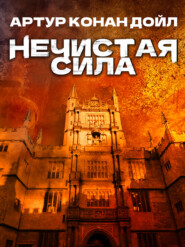По всем вопросам обращайтесь на: info@litportal.ru
(©) 2003-2025.
✖
The Mystery of Cloomber
Настройки чтения
Размер шрифта
Высота строк
Поля
The thought had hardly crossed my mind when I heard by the difference of the sound that the runner had turned the corner, and that his goal was beyond all question the laird's house.
Rushing down to the gate of the lawn, I reached it just as our visitor dashed it open and fell into my arms. I could see in the moonlight that it was none other than Mordaunt Heatherstone.
"What has happened?" I cried. "What is amiss, Mordaunt?"
"My father!" he gasped – "my father!"
His hat was gone, his eyes dilated with terror, and his face as bloodless as that of a corpse. I could feel that the hands which clasped my arms were quivering and shaking with emotion.
"You are exhausted," I said, leading him into the parlour. "Give yourself a moment's rest before you speak to us. Be calm, man, you are with your best friends."
I laid him on the old horsehair sofa, while Esther, whose fears had all flown to the winds now that something practical was to be done, dashed some brandy into a tumbler and brought it to him. The stimulant had a marvellous effect upon him, for the colour began to come back into his pale cheeks and the light of recognition in his eyes,
He sat up and took Esther's hand in both of his, like a man who is waking out of some bad dream and wishes to assure himself that he is really in safety.
"Your father?" I asked. "What of him?"
"He is gone."
"Gone!"
"Yes; he is gone; and so is Corporal Rufus Smith. We shall never set eyes upon them again."
"But where have they gone?" I cried. "This is unworthy of you, Mordaunt. What right have we to sit here, allowing our private feelings to overcome us, while there is a possibility of succouring your father? Up, man! Let us follow him. Tell me only what direction he took."
"It's no use," young Heatherstone answered, burying his face in his hands. "Don't reproach me, West, for you don't know all the circumstances. What can we do to reverse the tremendous and unknown laws which are acting against us? The blow has long been hanging over us, and now it has fallen. God help us!"
"In Heaven's name tell me what has happened?" said I excitedly. "We must not yield to despair."
"We can do nothing until daybreak," he answered. "We shall then endeavour to obtain some trace of them. It is hopeless at present."
"And how about Gabriel and Mrs. Heatherstone?" I asked. "Can we not bring them down from the Hall at once? Your poor sister must be distracted with terror."
"She knows nothing of it," Mordaunt answered. "She sleeps at the other side of the house, and has not heard or seen anything. As to my poor mother, she has expected some such event for so long a time that it has not come upon her as a surprise. She is, of course, overwhelmed with grief, but would, I think, prefer to be left to herself for the present. Her firmness and composure should be a lesson to me, but I am constitutionally excitable, and this catastrophe coming after our long period of suspense deprived me of my very reason for a time."
"If we can do nothing until the morning," I said, "you have time to tell us all that has occurred."
"I will do so," he answered, rising and holding his shaking hands to the fire. "You know already that we have had reason for some time – for many years in fact – to fear that a terrible retribution was hanging over my father's head for a certain action of his early life. In this action he was associated with the man known as Corporal Rufus Smith, so that the fact of the latter finding his way to my father was a warning to us that the time had come, and that this 5th of October – the anniversary of the misdeed – would be the day of its atonement. I told you of our fears in my letter, and, if I am not mistaken, my father also had some conversation with you, John, upon the subject. When I saw yesterday morning that he had hunted out the old uniform which he had always retained since he wore it in the Afghan war, I was sure that the end was at hand, and that our forebodings would be realised.
"He appeared to be more composed in the afternoon than I have seen him for years, and spoke freely of his life in India and of the incidents of his youth. About nine o'clock he requested us to go up to our own rooms, and locked us in there – a precaution which he frequently took when the dark fit way upon him. It was always his endeavour, poor soul, to keep us clear of the curse which had fallen upon his own unfortunate head. Before parting from us he tenderly embraced my mother and Gabriel, and he afterwards followed me to my room, where he clasped my hand affectionately and gave into my charge a small packet addressed to yourself."
"To me?" I interrupted.
"To you. I shall fulfill my commission when I have told you my story. I conjured him to allow me to sit up with him and share any danger which might arise, but he implored me with irresistible earnestness not to add to his troubles by thwarting his arrangements. Seeing that I was really distressing him by my pertinacity, I at last allowed him to close the door and to turn the key upon the outside. I shall always reproach myself for my want of firmness. But what can you do when your own father refuses your assistance or co-operation? You cannot force yourself upon him."
"I am sure that you did all you could do," my sister said.
"I meant to, dear Esther, but, God help me, it was hard to tell what was right. He left me, and I heard his footsteps die away down the long corridor. It was then about ten o'clock, or a little after. For a time I paced up and down the room, and then, carrying the lamp to the head of my bed, I lay down without undressing, reading St. Thomas a Kempis, and praying from my heart that the night might pass safely over us.
"I had at last fallen into a troubled sleep when I was suddenly aroused by a loud, sonorous sound ringing in my ears. I sat up bewildered, but all was silent again. The lamp was burning low, and my watch showed me that it was going on to midnight. I blundered to my feet, and was striking a match with the intention of lighting the candles, when the sharp, vehement cry broke out again so loud and so clear that it might have been in the very room with me. My chamber is in the front of the house, while those of my mother and sister are at the back, so that I am the only one who commands a view of the avenue.
"Rushing to the window I drew the blind aside and looked out. You know that the gravel-drive opens up so as to form a broad stretch immediately in front of the house. Just in the centre of this clear space there stood three men looking up at the house.
"The moon shone full upon them, glistening on their upturned eyeballs, and by its light I could see that they were swarthy-faced and black-haired, of a type that I was familiar with among the Sikhs and Afridis. Two of them were thin, with eager, aesthetic countenances, while the third was kinglike and majestic, with a noble figure and flowing beard."
"Ram Singh!" I ejaculated.
"What, you know of them?" exclaimed Mordaunt in great surprise. "You have met them?"
"I know of them. They are Buddhist priests," I answered, "but go on."
"They stood in a line," he continued, "sweeping their arms upwards and downwards, while their lips moved as if repeating some prayer or incantation. Suddenly they ceased to gesticulate, and broke out for the third time into the wild, weird, piercing cry which had roused me from my slumber. Never shall I forget that shrill, dreadful summons swelling and reverberating through the silent night with an intensity of sound which is still ringing in my ears.
"As it died slowly away, there was a rasping and creaking as of keys and bolts, followed by the clang of an opening door and the clatter of hurrying feet. From my window I saw my father and Corporal Rufus Smith rush frantically out of the house hatless and unkempt, like men who are obeying a sudden and overpowering impulse. The three strangers laid no hands on them, but all five swept swiftly away down the avenue and vanished among the trees. I am positive that no force was used, or constraint of any visible kind, and yet I am as sure that my poor father and his companion were helpless prisoners as it I bad seen them dragged away in manacles.
"All this took little time in the acting. From the first summons which disturbed my sleep to the last shadowy glimpse which I had of them between the tree trunks could hardly have occupied more than five minutes of actual time. So sudden was it, and so strange, that when the drama was over and they were gone I could have believed that it was all some terrible nightmare, some delusion, had I not felt that the impression was too real, too vivid, to be imputed to fancy.
"I threw my whole weight against my bedroom door in the hope of forcing the lock. It stood firm for a while, but I flung myself upon it again and again, until something snapped and I found myself in the passage.
"My first thought was for my mother, I rushed to her room and turned the key in her door. The moment that I did so she stepped out into the corridor in her dressing-gown, and held up a warning finger.
"'No noise, she said,' Gabriel is asleep. They have been called away?'
"'They have,' I answered.
"'God's will be done!' she cried. 'Your poor father will be happier in the next world than he has ever been in this. Thank Heaven that Gabriel is asleep. I gave her chloral in her cocoa.'
"'What am I to do?' I said distractedly.
"'Where have they gone? How can I help him? We cannot let him go from us like this, or leave these men to do what they will with him. Shall I ride into Wigtown and arouse the police?'
"'Anything rather than that', my mother said earnestly. 'He has begged me again and again to avoid it. My son, we shall never set eyes upon your father again. You may marvel at my dry eyes, but it you knew as I know the peace which death would bring him, you could not find it in your heart to mourn for him. All pursuit is, I feel, vain, and yet some pursuit there must be. Let it be as private as possible. We cannot serve him better than by consulting his wishes.'
"'But every minute is precious,' I cried. 'Even now he may be calling upon us to rescue him from the clutches of those dark-skinned fiends.'
"The thought so maddened me that I rushed out of the house and down to the high road, but once there I had no indication in which direction to turn. The whole wide moor lay before me, without a sign of movement upon its broad expanse. I listened, but not a sound broke the perfect stillness of the night.
"It was then, my dear friends, as I stood, not knowing in which direction to turn, that the horror and responsibility broke full upon me. I felt that I was combating against forces of which I knew nothing. All was strange and dark and terrible.
"The thought of you, and of the help which I might look for from your advice and assistance, was a beacon of hope to me. At Branksome, at least, I should receive sympathy, and, above all, directions as to what I should do, for my mind is in such a whirl that I cannot trust my own judgment. My mother was content to be alone, my sister asleep, and no prospect of being able to do anything until daybreak. Under those circumstances what more natural than that I should fly to you as fast as my feet would carry me? You have a clear head, Jack; speak out, man, and tell me what I should do. Esther, what should I do?"
He turned from one to the other of us with outstretched hands and eager, questioning eyes.
"You can do nothing while the darkness lasts," I answered. "We must report the matter to the Wigtown police, but we need not send our message to them until we are actually starting upon the search, so as to comply with the law and yet have a private investigation, as your mother wishes. John Fullarton, over the hill, has a lurcher dog which is as good as a bloodhound. If we set him on the general's trail he will run him down if he had to follow him to John o' Groat's."
"It is terrible to wait calmly here while he may need our assistance."
"I fear our assistance could under any circumstances do him little good. There are forces at work here which are beyond human intervention. Besides, there is no alternative. We have, apparently, no possible clue as to the direction which they have taken, and for us to wander aimlessly over the moor in the darkness would be to waste the strength which may be more profitably used in the morning. It will be daylight by five o'clock. In an hour or so we can walk over the hill together and get Fullarton's dog."

















